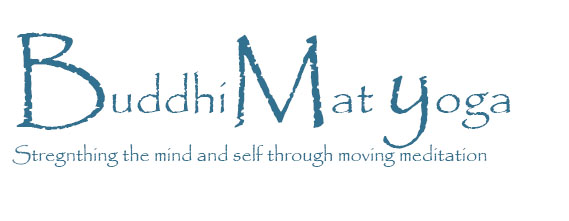-
Home / BuddhitMat Yoga - A Rational Yoga Practice
Was this valuable to you?
other links and editorials from Julie
Are Rational and Yoga a Contradiction?
Rational and Yoga. Is that not a contradiction? I argue it is not. You’ve heard the word “mindfulness” used to describe meditation, yoga, and other holistic practices, right? These aren’t mind-less endeavors. Living properly and achieving good health require you to use your mind rationally.
From more than a few difficult, personal experiences, I have learned the harm in removing the mind from my actions. Zoning out while coasting on the ride of emotions has generated quite a bit of churn and instability in my life. Eating French fries for three days straight can make me very sick. Even physical activities such as running require my mind to actively push me to my edge.
Translated, Buddhimat literally means a rational, enlightened being. The root word of buddhi can be used to represent knowledge.
Buddhimat is a reminder what yoga means to me– mindful attention and awareness to our Self, resulting in self-improvement. Yoga is turning our attention inward, whether it be to learn, to heal, or to self-improve (physically or mentally). To be successful, we need our minds to be actively involved; to be focused – not passively wandering. It is having a rational yoga practice.
The name BuddhiMat Yoga reminds me that a successful yoga practice is not about practicing in auto-pilot. It requires active attention to our bodies, closely listening to what they are telling us. For example, it would be irrational to push ourselves through another chaturanga (low push-up) if our body tell us it’s going to generate injury. Or, when we feel pain and immediately make excuses to jump out of that same chaturanga, it’s best for us– being fully integrated– to realize if it is good pain and hold just a few breaths longer.
The root of buddhi reminds us also to always seek the truth. It’s easy to imagine yoga as a tradition going back thousands of years and passed from guru to guru. For me, being rational requires understanding how those traditions are complimented by new discoveries. It also requires understanding the “why” before I do something in a yoga class. For example: why does yoga make us more relaxed? Do back-bends really open up our hearts? Do inversions reverse blood flow? Why do we say “breathe in from your chest” when the air enters your nose first? Why don’t we first define what bliss is before we say “I’ll find it on my yoga mat?”
And, it’s not about throwing around buzzwords for yoga just because they are cool.
But, most of all, being rational in our yoga practice does not mean removing relaxation from yoga. As we move through our yoga class, we pay attention to our breath to bring ourselves to the present, eliminating the “mind chatter.” Mind chatter consists of those random worries that fill up our day. They are irrational fears, jealousies, angers, and self-doubts. They get in the way of us thinking logically, rationally, and most importantly, of being calm and in the moment.
As a yoga teacher, I am constantly learning and determining what yoga means to me. Part of being rational is understanding when you don’t have all the answers. I welcome you to challenge my assumptions and hope you’ll share literature and ideas here that expand our understanding of yoga. Namaste.
About Rational Yoga Blog
 rational-yoga/rational-yoga-bloghttps://valme.io/c/rational-yoga/rational-yoga-blogJulieWhat can we say about this community? It's awesome. (How's that for filler?)
rational-yoga/rational-yoga-bloghttps://valme.io/c/rational-yoga/rational-yoga-blogJulieWhat can we say about this community? It's awesome. (How's that for filler?)

